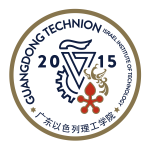Guangdong Technion - Israel Institute of Technology (GTIIT), China & Technion-Israel Institute of Technology, Israel.
The Physics Program (group of Asst. Prof. Khadga Jung Karki) is looking for one PhD and/or MSc student to conduct experimental research in understanding the effects of electronic (and possibly vibrational) coherence on the fluorescence of molecules and molecular aggregates by using fluorescence detected two-dimensional spectroscopy. Thesis work period for the PhD student is three to four years. Fellowship is 60,000 RMB/year and increases to up to 108,000 RMB/year in the final year depending on the performance. Thesis work period for the MSc student is two to three years. Fellowship is 42,000-54,000 RMB/year depending on the academic performance. The PhD student will spend one year, and the MSc student will spend 6 months at Technion, Haifa. Fellowship will be increased during this period. Check https://sites.gtiit.edu.cn/research/graduate-studies/fees-finance/ for details.
Fluorescence detected two-dimensional spectroscopy is a powerful technique that can probe the effects of electronic and vibrational coherences in molecules and molecular aggregates on the external signals. As functionality of systems such as organic light emitting diodes or solar cells depend on the long-lived external signals that include fluorescence and photocurrent, the technique provides a detailed information about the role of coherences on the functioning of the devices. In fact, this unique technique promises to initiate new directions in experiments which enable us to utilize quantum properties of matter in useful devices. However, some challenges in interpreting the results of the measurements have persisted. The main difficulty has been in isolating the nonlinear signals induced by the ultrafast coherences from other nonlinear signals contributed by long lived incoherent processes. A detailed theoretical analysis has shown that it is possible to differentiate the two types of signals by analyzing the phases. In this project, we aim to experimentally test the theoretical prediction and carry out detailed experiments on molecules and molecular aggregates that can be used in LEDs and solar cells.
Fluorescence detected two-dimensional spectroscopy; organic photovoltaics and light emitting diodes; femtosecond lasers; phase modulation
- Bachelor’s/MSc degree in physics or physical chemistry (essential).
- Experience in different forms of spectroscopy (essential for PhD student).
- Familiarity with programming languages (c, c++ , matlab, python, etc. ) and proficient in one of them (essential).
- Ability to author scientific reports and papers (essential).
- Good communication skills and strong command of English (essential).
- Ability to work independently as well as in a team environment (essential).

